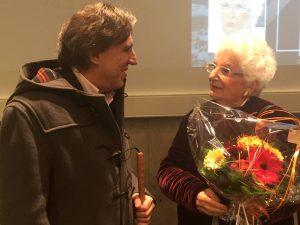NEWS Liliana Segre, Apologies from Ticino
A memorable visit provided new proof of the courage of Liliana Segre and marked the closing of a circle.
Liliana Segre meets thousands of youngsters every year to tell them about her story and her wounds, and also to share a message of commitment that is focused towards the future.
However, she had never done this in Lugano, in the canton of Ticino, Switzerland. This was the city that dreadfully warded off both her and her father when they were on the run from the Nazi-Fascist monster. It was just the beginning of the catastrophe followed by their arrest and deportation to Auschwitz-Birkenau. Today she brings to the Senate the number tattooed on her arm so as to protect everyone’s rights.
“I have many friends here. It would be unfair to generalize, but of course I can’t say that I don’t hold a grudge against the man who sent us back to Italy that day. I got on the ground as I was so desperate and I held his legs, begging him not to turn us away. He had the guards bring us back with their bayonets pointing at our backs. I remember they were sneering at us”- said the senator for life in the great hall of the University of Italian Switzerland during a crowded meeting, organized by the Goren Monti Ferrari Foundation. Manuele Bertoli, a member of the Council of State of Ticino was there to listen to her among the youngsters, as well as Ferruccio de Bortoli, the honorary president of the Milan Memorial of the Shoah.
“She was a victim – Bertoli said – of unfair laws, not only Italian laws, but also our country’s. Here she was asking for asylum, but Switzerland did not grant it. It did in other cases, but not in hers. Although it’s not in my power – national authorities should do this – I apologize both personally and as a representative of the Canton Government, hoping that such mistakes shall never be repeated”.
These words gave even greater meaning in a day which will remain in people’s memory for a long time. “We apologize today for the mistakes of yesterday because we don’t want them to be repeated tomorrow. Wounds must be healed, not ignored, so that we do not add today’s indifference to that of yesterday. Those who suffered need to see the acknowledgement of guilt by those who made them suffer; not for revenge nor for self-pity but for justice, for that principle that seeks to balance wrong with right” – Carlo Silini wrote today inthe Corriere del Ticino.
Translated by Rachele Ferin and revised by Simone Simonazzi, students at the Advanced School for Interpreters and Translators of Trieste University, interns at the newspaper office of the Union of the Italian Jewish Communities.

